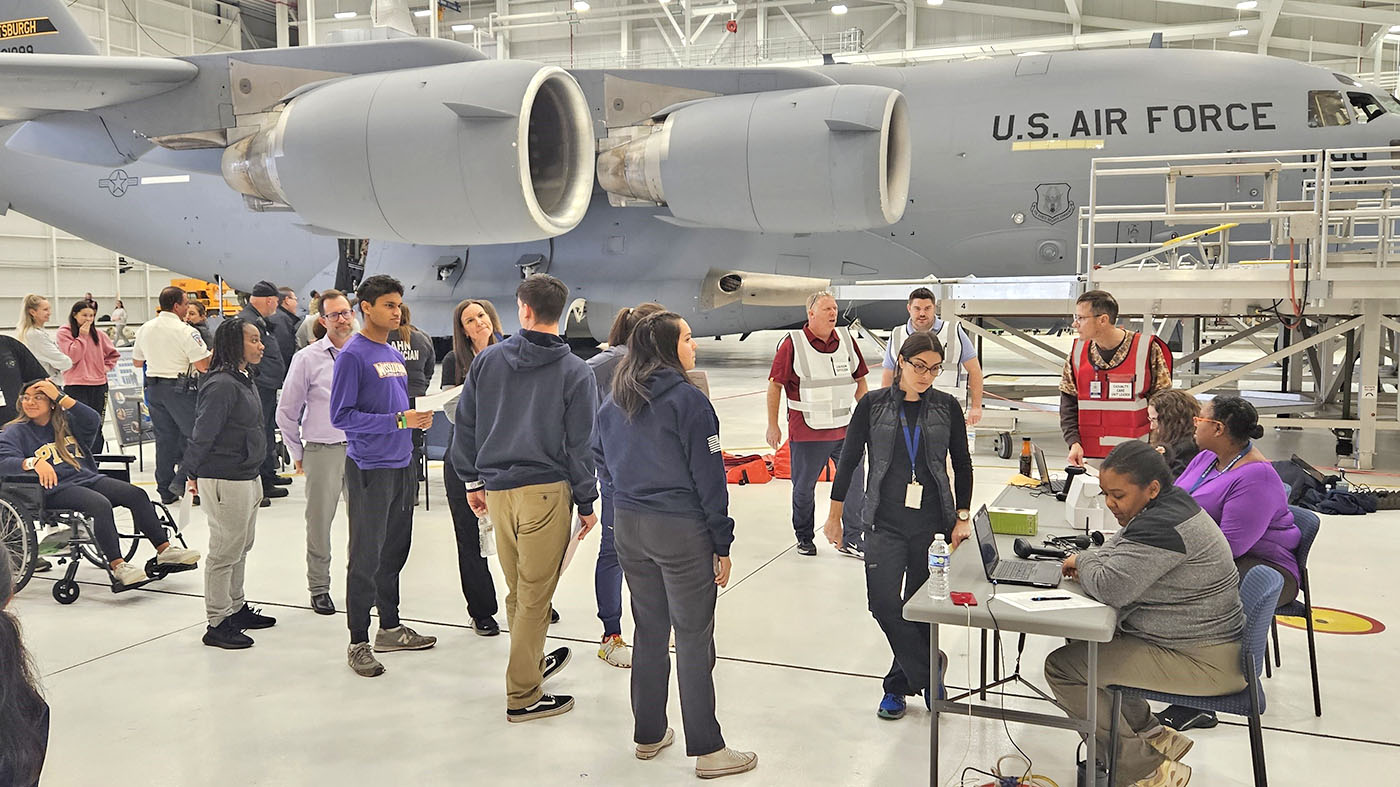This article was originally posted on Inside Veterans Health.
Sex is a big deal, right? So if your sex life isn’t all that healthy, chances are the rest of your life — including your overall health — might not be anything to write home about either. At least that’s the theory being put forward by two VA health care providers who feel that VA may need to get over its shyness and start routinely asking Veterans about their sex lives. Delicately, of course.
A Struggle
“Every clinician should be asking their Veteran patients about sexuality,” said Dr. Linda Mona, who’s spent the last nine years running an intimacy clinic at the Long Beach VA. “There are many Veterans struggling with this part of their life, which means there are so many families struggling with this issue.
“When two people are having a mutually satisfying sexual relationship, it strengthens their connection,” she noted. “And it therefore strengthens the whole family.”
Apparently, however, people just don’t like to talk about it because it’s embarrassing.
“Providers don’t know how to talk about it,” Mona corrected. “Patients and providers don’t know how to bring up the subject, because it’s so personal. But if we’re going to provide comprehensive, patient-centered care, if we’ve going to treat the whole Veteran, then we need to broach the topic. And we need to broach it in a respectful way.”
Anxiety, Stress and Meds: a Recipe for Disaster
The psychologist said trouble in the bedroom seems to be fairly widespread in a lot of the Veteran population. And no wonder.
“We see both men and women coming back from overseas and having difficulties with their primary relationships,” she said. “As a Veteran, you might be dealing with depression, anxiety, or posttraumatic stress disorder. Then there’s perhaps physical and cognitive injuries such as traumatic brain injury or loss of a limb. On top of that, you’re trying to fit into your new life as a civilian. And while all that’s happening, you may be on several different medications for all these psychological or physical injuries. When you mix all this together, is it any wonder your sex life is suffering?
“To make matters worse,” she added, “your inability to reconnect sexually with your partner just adds to all these other stressors.”
Dr. Jessica Punzo, a psychology fellow at the San Diego VA, agreed that Veterans seem to have a lot more stressors to deal with than the general population.
“We screen for PTSD and depression. We need to screen for sexual health, too.” — Dr. Jessica Punzo
Pushed to the Bottom
“When you transition from the military to civilian life, you have a lot of things coming at you,” Punzo said. “You’re trying to get to your therapy sessions, to your doctor appointments. You’re trying to reconnect with your wife or your husband, your kids. So sex is one of the things that gets pushed to the bottom of the list. But research shows that as sexual satisfaction increases, so does overall quality of life.
“If all is not well in the bedroom,” she warned, “it may possibly show up in other parts of your life outside the bedroom.”
And for some Veterans, there’s the additional complication of military sexual trauma (MST). “Many people who’ve had a sexual trauma have difficulty with sex later on,” explained Punzo, who provides individual and group therapy for Veterans who’ve experienced MST. “Even if a victim of MST wants to be intimate with their partner, they may not be able to. There tends to be a lot of shame that comes with experiencing a sexual trauma. Any kind of closeness or intimacy with another person can trigger flashbacks.”
A Touchy Subject
Punzo said it’s up to VA health care providers to broach the touchy subject of sexual health.
“It’s worth doing a sexual health assessment on all of our Veterans,” she said. “It should be standard. We screen for PTSD. We screen for depression, for suicidal tendencies. We need to be screening for sexual health, too. If our initial assessment indicates a sexual issue, we can start the process of addressing it.”
Linda Mona agreed. “Our job as VA clinicians is to create a forum in which to discuss sexuality,” she observed. “Veterans don’t have to talk about their sex life if they don’t want to. But if Veterans want to discuss the topic, we need to give them the opportunity. We need to train our providers on how to bring up sexual health as a routine part of any screening we do.
Problem? What Problem?
“I have patients who have good, solid intimate relationships with their partners,” Mona continued. “Their foundation is stellar. But that doesn’t mean they aren’t having problems with their sexual relationship. The VA can help them with that, but first we have to know there’s a problem. If we don’t ask them, chances are they’re not going to tell us.”
The psychologist noted that most Veterans go through at least one health screening every year.
“They’re seen by a team of professionals, including a primary care doctor, a social worker, a psychologist and others,” she explained. “At some point during the screening, there should be a question posed to them about their sexual health. Some member of the team should ask a question that goes like this: ‘To what degree are you satisfied with your sex life?’ Or maybe this: ‘Are there ways in which your other health issues might be interfering with your sex life?’
“It’s a way to open up a dialogue,” she continued. “If the Veteran answers that all is well in the bedroom, fine. If not, then we need to be prepared to refer them to the appropriate professional for follow-up.”
Topics in this story
More Stories
Air Force Veteran Shireta Jones overcomes obstacles with support from VA and adaptive devices to continue her passion for pickleball.
Pittsburgh VA and its partners practice relocating hospitalized patients during disasters and public health emergencies.
VA and Veterans Yoga Project are working together to make more Veterans aware of the benefits of yoga while offering more classes.







This is being touted as serious problem for vets- I hear the Docs are forced to prescribe Viagra to homeless vets, when they don’t want it. The problem is Politics/ hand in big Pharma kick backs, Vets are used as a pawn… Once again, get out of peoes personal lives unless they ask invite you in!
This article, though well written and has good intentions does what most articles like these do: Identify and obvious problem…again….misses out on the real issue…..and offers no real answers. Screening for physiological sexual issues is not practical in a group screening or survey as noted by JD, nor is is practical in a 15 to 30 minute (maybe 45 minute) primary care or psychiatric appointment. Worse, if it is brought up an inadequate lab evaluation is usually done and the issue is prolonged because it is masked by a band-aide of inappropriate pills, shots, or gels. Like most medical issues if it is prolonged it gets worse and becomes more difficult to manage/treat. First is is difficult to get providers to understand that libido and sexual function are 2 different things, second, a true workup includes a full functional lab panel of not just testosterone for a male and basic hormones for a female patient, but full thyroid function, adrenal function, pituitary workup, testosterone in females both total AND free, along with Vitamin D levels and basic CMP, etc. THEN interpretation must go beyond looking at the lab references for “normal” but to actually understand what is optimal and then CLINICALLY CORRELATE the numbers. Not just act on or treat the numbers. This functional approach goes well beyond what a psychiatrist/psychologist is usually trained. Most drugs that VA patients are on affects sexual function in a negative way. That is tough to understand and manage. This is a very tough and important subject. It is not a matter of just identifying but knowing what to do once the subject is brought up. I FIRMLY believe that if a full metabolic and functional workup is done as a baseline for or veterans, instead of piecemealed care, that many issues beyond libido and sexual health can be improved. This matters. We need an honest Wounded Warrior Wellness Center system.
Ben Gonzalez, MD LTC(ret) a provider for Wounded Warriors
That is garbage, because when we have these screenings it is in large groups and I wont discuss any personal issues when there are a group of A-holes I work with, because this is info about me that don’t need to be known to them. There is no privacy in the Military yeah I know there are privacy acts and they are a joke I see SSN and personal info laying around everyday. Perhaps if I could get a real appointment and not just a group screening I would tell the so called UN-professionals that I have issues and need help and I’m worried about my marriage, because I cant seem to perform in the bedroom anymore. I went to a psych doc a few times and not once did they listen to what I had to say and every time I had more drugs shoved into my face. Which seems to me as “here numb the problem cause we wont fix it” The medical personnel couldn’t care less about what we have to say, there thing has always been get them in and get them out. I have been in the Military for 10 years now and I wont go to Military medical unless I’m going to die. I sincerely wish that we could be seen by civilian doctors that have not been corrupted by the Military.
Hi JD,
I’m so sorry to hear you have had what sounds like a terrible experience within the VA or while on active duty with medical personnel. It’s important to remember that there are various clinics within VA hospitals which all may have slightly different procedures for assessment. I spoke from my experience within the clinic I work at, in my VA. Here we are able to provide individual intake evaluations on our veterans, as we are sensitive to the very issues you are bringing up. I do hear your frustrations, but want to point out that all psychologists who work within the VA or the military are not as you described. There are so many of us who do care and genuinely want to help and listen closely to your concerns. My hope is you can locate a professional like this to be able to have a more effective and validating experience.
Best,
Dr. Punzo
The psychologist noted that most Veterans go through at least one health screening every year. “They’re seen by a team of professionals, including a primary care doctor, a social worker, a psychologist and others,”
What VA does she work for? I’ve never had a single health screening in the 20 years I’ve been a Veteran, let alone having one every year. It’s hard enough just getting in to see a PCP.
Hey Dave, I’ve been contacted by the local clinic VA here in So. Cal every year for my yearly screening. I do go, even though I have very good insurance through my work. A VA doctor told me it was a very good idea to continue with the yearly screenings through the VA, since they have records of me since I was 17 – I enlisted at 17 – had my 18th birthday in Parris Island, a day to remember! By having records of my health since I was 17, they know more about me than any doctor I go to once, and may change at the next insurance pick from work. Contact the VA and get on the yearly screenings!
I now have records in hand of acts against nature horrible acts Dr X has assaulted multiple Veterans that have cried out with tort claims that were denied because of the statue of limitations Dr X works on the reproductive organs of Veterans he has the ability to take the fight out of the veteran with the type of practices he assaulted a veteran twice with a instrument he is doing unnecessary procedures on young attractive Veterans mutilating Veterans penises and reproductive organs you must understand I will soon ask for another profile of him and if he is still Harming Veterans. I really don’t know what I will do I will probably have to jump into a volcano you must understand at first it was difficult with Mr.B the release of information officer American Lake division having a letter generated from Ms. M’s office to him just to get him to work with me these numbers of denied tort claims of unnecessary procedures an American Lake VA is news that makes this Veterans soul rattle 2 pieces I will soon go across this country and ask for these profiles you must understand where there is one monster there is many this is not my job my question why the new secretary does not want to speak with me now I know he is a coward I have asked so many times
Two things:
1) I removed the personal names due to our policy.
2) VA’s Office of Inspector General (OIG) Hotline receives, screens, and refers OIG mission-related complaints within VA. Cases are accepted on a select basis regarding issues having the most potential risk to veterans, VA programs and operations, or for which the OIG may be the only avenue of redress. More information is available at http://www.va.gov/oig/hotline/.